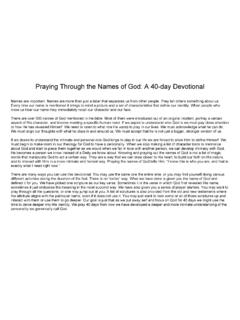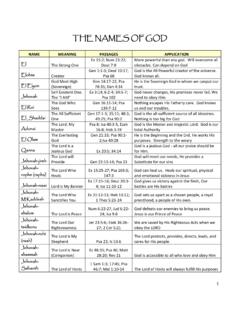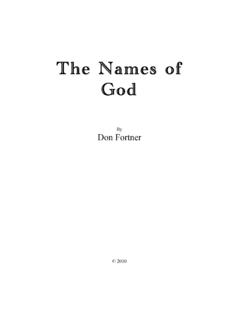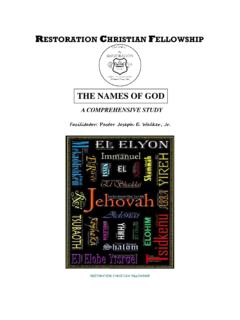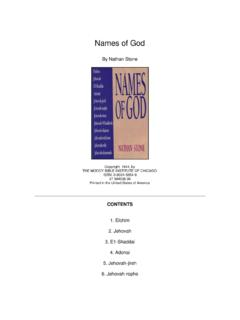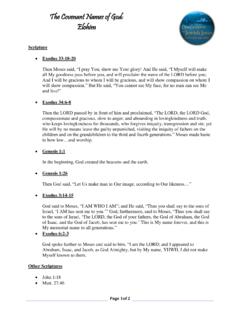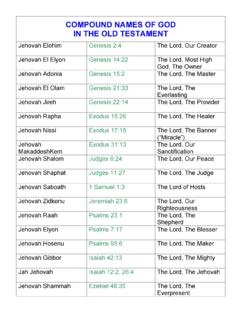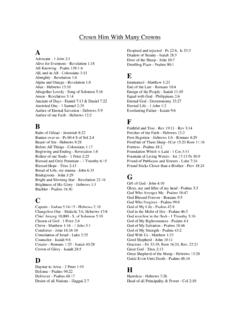Transcription of The Names of God, Their Pronunciation and Their Translation
1 ISSN 1661-3317 De Troyer, The Names of god lectio difficilior 2/2005 Kristin De Troyer The Names of god , Their Pronunciation and Their Translation : A Digital Tour of Some of the Main Zusammenfassung: Weit verbreitet ist die wissenschaftliche Auffassung, dass zum einen der Gottesname, also die vier Buchstaben des Tetragramms, nicht ausgesprochen wurde und dass zum anderen die bersetzung ins Griechische kyrios gelautet habe. In diesem Beitrag wird stattdessen eine existierende Vielzahl von Formen f r den Gottesnamen nachgewiesen, die mindestens bis zum 3. Jahrhundert ausgesprochen wurden. Die erste griechische bersetzung des Tetragramms lautete nicht kyrios, sondern theos.. It is appropriate for this journal to start with a question regarding a text critical rule and an exception.
2 Why is it that in almost all cases of textual variants the most difficult reading is given priority and in case of the name of god the easiest reading, namely Adonai, the Lord, is preferred? I. The name of god 1. The standard editions Most students and scholars of the Hebrew Bible, use Biblia Hebraica Stuttgartensia (= BHS), the famous one volume (larger or small) of the Hebrew Bible edited by a team of scholars under the leadership of Rudolph Kittel and Paul Kahle and produced by the Stuttgart Bible Society, the Deutsche Bibelgesellschaft. Currently, a group of scholars is preparing a new edition of this text; the project is called BHQ, Q standing for Quinta2. In this project, the old Kahle edition is considered the first edition (1905), then, come three editions from the Kittel/Kahle text (1937, 1972-77, 1983); the new edition is, hence, the fifth in its kind.
3 The first fascicle of BHQ has been published In this edition, the name of god , more specifically the Tetragrammaton (that is literally, the four consonants) is written without the vowels that it should have had. 1 ISSN 1661-3317 De Troyer, The Names of god lectio difficilior 2/2005 Figure 1: hwhy Yahweh ynFd$)j Adonai This one can see on almost every page of BHS (and BHQ though the name of god does not appear in the Book of Esther). See image 1: page of the Biblia Hebraica Stuttgartensia (edited by Karl ELLIGER and others. Stuttgart 1990), containing Deuteronomy 6:4-22. Most scholars acknowledge that the Tetragrammaton was probably pronounced as Yahweh. Bruce M. Metzger writes: While it is almost if not quite certain that the name was originally pronounced Yahweh, this Pronunciation was not indicated when the Masoretes added vowel sound to the consonantal Hebrew text.
4 To the four consonants YHWH of the name , which had come to be regarded as too sacred to be pronounced, they attached the vowel signs indicating that in its place should be read the Hebrew word Adonai meaning Lord (or Elohim meaning God ). 3 He then continues and writes: Ancient Greek translators employed the word Kyrios ( Lord ) for the name . The Vulgate likewise used the Latin word Dominus ( Lord ). 4 This argument suffices for the rendering of the Tetragrammaton in the English Translation , NRSV, with the LORD . Metzger states in his introduction: Careful readers will notice that here and there in the Old Testament the word LORD (or in certain cases GOD) is printed in capital letters. This represents the traditional manner in English versions of rendering the Divine name , the Tetragrammaton (see the notes on Exodus ,15), following the precedent of the ancient Greek and Latin translators and the long established practice in the reading of the Hebrew Scriptures in the synagogue.
5 5 Many introductions to the Hebrew grammar will explain the phenomenon that the name of god is not to be read as it is written in the text, but as it is supposed to have been written in the Indeed, in the Hebrew Bible, more precisely in the Masoretic text, the consonants of the name of god are written (Ketib, hwhy), but not pointed with its presumed vowels (hFwOhy:). The vowels that are added to the consonants of the Tetragrammaton are the vowels of the word Adonai (ynFd$)j). When the Masoretes wanted the readers to read a word differently from the one written in the text (the Ketib), they notified the readers of the different reading by attaching a circellus (a little circle) on top of 2 ISSN 1661-3317 De Troyer, The Names of god lectio difficilior 2/2005 the Ketib, and by writing the related word, which should be read instead of the Ketib, in the margin.
6 The word in the margin is indicated with a Qof, which is the first letter of the word Qere. Qere stands for what ought to be read . As the name of god , however, occurs on almost every page, the Masoretes did not add little circelli on every occurrence of the Tetragrammaton, and they did not provide its alternative reading Adonai: alef, daleth, nun, yod in the margin. The name of god , however, is supposed to be read for eternity using the word Adonai. The most decisive argument for the replacement of the Tetragrammaton by the alternative Adonai stems from the double expression Adonai and the Tetragrammaton (hwhy ynFd$)j, Adonai plus the Tetragrammaton, see for instance Amos 7:1; 8:1, etc.). In case of these double expressions, the vowels of the Qere are not the vowels of Adonai, but of Elohim (MyihwOl)v), turning the double expression into Adonai Elohim (hwOhye ynFd$)j,, Adonai Elohim) instead of Adonai Adonai.
7 According to some scholars, the Masoretes wanted to avoid the repetition of Adonai after the title Adonai, thus avoid the reading Adonai Adonai. They instead filled out the vowels of the Tetragrammaton with the vowels of the word Elohim, creating the reading Adonai Elohim instead of Adonai Adonai. This accordingly proves that the Tetragrammaton was normally read as Adonai. A small operation, however, is needed in order to read this alternative substitute of the name of god , namely Elohim. Indeed, in order to come to Elohim one has to first turn the hatef segol into a sewa and second delete the holem for non-Hebraist readers, this means turning the e-vowel into a non-vowel and dropping the o-vowel.
8 The only vowels that are actually in all the manuscripts and thus the only vowel that reminds the reader of the alternative Elohim is the hireq the This small operation takes me to the vocalization of Adonai in the manuscripts. 2. What does one read in old codices, such as Codex Leningrad and Codex Aleppo? Most of the printed Hebrew Bibles are based on Codex Leningrad, a codex dated to 1008/1009, located at the library of St. Petersburg. This Codex is the oldest complete Hebrew bible. Most scholarly editions of the Bible are based on this The usual form of the name of god , however, in Codex Leningrad is hwFhy: and not hFwOhy:. 3 ISSN 1661-3317 De Troyer, The Names of god lectio difficilior 2/2005 See image 2: page of Codex Leningradensis.
9 A Facsimile Edition (edited by David Noel Freedman and others. Grand Rapids and Leiden 1998) containing Deuteronomy 5:31b-6:22a. In other words, there is a holem, an o-sound, missing in the printed form of the Tetragrammaton. The first form, hwFhy: can be read as the Aramaic noun )mF#:, the name , the Divine Name9. The Masoretes, thus, wanted the readers to read the Tetragrammaton as ha-shema , in Hebrew ha-shem , the name . Figure 2: hwFhy: not hFwOhy:. hwFhy: is the Aramaic word )mF#: the name Indeed, like many Jewish readers of the Bible today do, God is referred to in the margins of the Masoretic Bible as ha-shema , the Jewish Aramaic word for the name . The oldest complete copy of the Hebrew Bible does hence, not render the Tetragrammaton with the Lord, but with the name !
10 Similarly, Codex Aleppo and the editions of the rabbinic Bible have the name instead of Adonai .10 I acknowledge that there are a couple exceptions to this rule, namely a couple of places where Codex L indeed has Adonai as Qere, instead of The name (see for instance, Ex 3:2).11 I am also aware that there are scholars who try to explain the vowels under the Tetragrammaton as a derivative from Adonai. They claim that the holem ( o ) was deliberately omitted from the vowels of Adonai as to make the reading and thus Pronunciation of the Tetragrammaton completely It is, however, much easier to explain the vowels under the Tetragrammaton as referring to the word the name . When the Tetragrammaton is, however, preceded by the title Adonai, it is read as Elohim.
